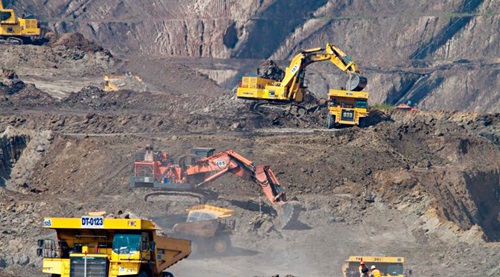
Newmont drops GH¢3.965 billion in taxes - as govt weaves through throes of fiscal crisis
The payment of a GH¢3.965 billion by Newmont Ghana in direct taxes, royalties and levies as well as the carried interest to the government, through the Ghana Revenue Authority (GRA), the Forestry Commission, and the Ministry of Finance for 2023 on the operations of Ahafo South and Akyem Mines is welcome news for a country caught up in the throes of a fiscal crisis.
This amount is broken down into Corporate Tax of GH¢2.488 billion; Minerals Royalties of GH¢749 million: GH¢387.17 million as Pay As You Earn (PAYE); GH¢229.53 million as Withholding Tax; and GH¢38.90 million as Forestry Levy.
The mining giant also paid an amount of GH¢67.33 million as Carried Interest for 2022 and a Property Rate levy of GH¢4.77 million. Newmont paid GH¢1.108 billion cedis in the fourth quarter of 2023.
This is by far the largest total tax payment made by a company to the state. Just as importantly it suggests that this year’s total tax payments by Newmont in Ghana has exceeded the 2022 year figure of GH¢2.76 billion paid, which is a 43.6 per cent increase.
Tax payments by Newmont is expected to get bigger in the coming years as the company’s third gold mine is about to come on stream.
The Ahafo North mine, located near its flagship Ahafo South mine, which is currently under construction is projected to produce between 350 to 375 million ounces of gold on average each year over its expected 13-year mine life span, although during the first five years, production will be closer to 300 million ounces before ramping up afterwards.
Open pit
It is designed as an open pit (surface) mine utilizing a stand-alone mill for processing 3.8 million ounces of gold reserve and 1.4 million ounces of identified gold resource. For Newmont, there is plenty of upside potential for more resources on all sides which may result in increased production and/or longer mine life.
But the mine will not come cheap. After initially budgeting $850 million to build it – the amount approved by Newmont’s board of directors back in 2021 – the approved mine development cost has risen to between $950 million and a billion dollars.
Nonetheless, it is worth the wait – with the corporate tax rate for mining set at 35 per cent plus another five per cent in royalties even before PAYE and other levies are considered, Ghana stands to receive even more from Newmont each year from 2026 , with tax payments possibly exceeding GH¢4 billion a year, going by back of the envelope computations.
This illustrates the sheer importance of Ghana’s mining industry to the country’s fiscal fortunes, which indeed has become more crucial than ever before during the ongoing economic difficulties.
Instructively, the fiscal contributions of the mining industry continue to grow by the year.
If no mining
Responding to questions on the contribution of mining to the economic development of the country, Chief Executive Officer of the Ghana Chamber of Mines, Dr Sulemanu Koney pointed to the sector’s fiscal payment of taxes, which according to the Ghana Revenue Authority (GRA), contributed GH¢6.82 billion, together with the quarrying sub-sector, including dividend payment of GH¢435 million in 2022.
The minerals sector also consolidated its position as the country's largest source of foreign exchange in 2022.
Data from the Bank of Ghana also show that revenue from the export of minerals accounted for 39 per cent of gross merchandise receipts, exceeding the outturns of crude oil, cocoa and other export commodities.
The Chamber of Mines executive stated that the country would have lost $1.41 billion in mineral export revenue routed through the Bank of Ghana and 2.73b that passes through the commercial banks if there were no mining. This foreign exchange helps to boost the country’s reserves.
Negotiated deals
Bank of Ghana data puts the export earnings of the industry at $5.641 billion in 2021.
Indeed, mining companies, under recently negotiated deals with the Bank of Ghana now provide 20 per cent of their production to the central bank in exchange for cedis rather than dollars, this will enable the country to substantially rebuild its depleted gross foreign reserves without having to use foreign exchange to do so.
Additionally, the mining companies are providing a similar amount, again in exchange for cedis rather than dollars, for government to execute its novel gold for oil initiative which has contributed to the lowering of petroleum product prices in the country through the elimination of broker commission costs.
The mining sector plays a vital role in the Ghanaian economy, as it attracts more than half of all foreign direct investment (FDI) and generates more than one-third of all export revenues.
The industry is the largest tax-paying sector in the country, contributing nearly one fifth of the country’s entire tax revenue and makes a significant contribution to gross domestic product (GDP) - contributing between five and seven per cents.
It is, therefore, not surprising that the Ghanaian public have become accommodating of the mining industry.
Increasing formalisation
A period of consolidation and reform, the Ghanaian mining industry is in a strong position for long-term growth. A firmer regulatory framework, the increasing formalisation of small-scale mining, and more streamlined assaying should all benefit legitimate mining companies, as well as the government exchequer.
Ghana boasts political stability and a strong institutional framework, and these factors are expected to continue to underpin investment in the mining sector in years to come.
However, international players will be keen on some clarification with regard to plans to increase state equity stakes in key operating companies.
